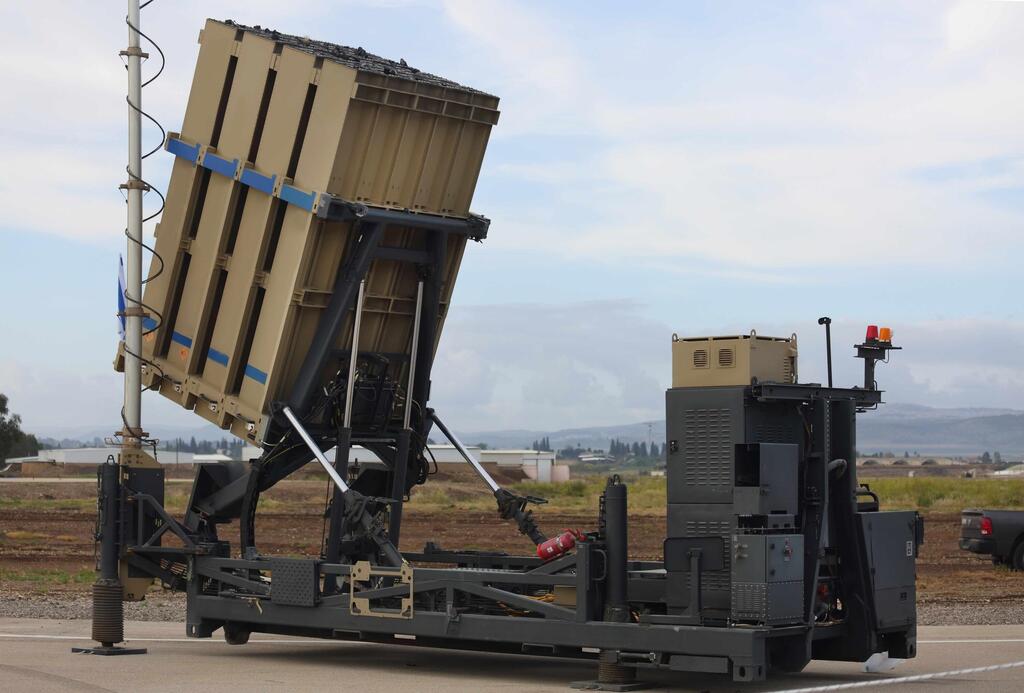
Rafael to hire 2,000 amid surge in employees who want to ‘participate in war effort’
Sagit Sela-Gal, Executive VP of Human Resources for Israeli defense company Rafael, speaks about meeting demand during wartime with 20% of employees drafted into the reserves and 250 evacuated from their homes, as well as Rafael’s plans to hire 2,000 new employees in 2024 after exceeding more than NIS 40 billion in sales.
Since the start of the war, Israeli defense company Rafael has been flooded with job applications, including from former startup CEOs, employees from giant corporations, and retirees seeking to return to work. Everyone is eager to participate in the war effort. Even those already drafted to the army come when they’re on leave to help the company which is responsible for the development and production of Israel's main military and defense systems, including Iron Dome, Trophy (armored vehicle active protection system), and the David’s Sling missile defense system. 'There is no doubt that we don't need to 'sell' the organization," says Sagit Sela Gal, the company's Executive VP of Human Resources.
Since the start of the war, Israeli defense company Rafael has been flooded with job applications, including from former startup CEOs, employees from giant corporations, and retirees seeking to return to work. Everyone is eager to participate in the war effort. Even those already drafted to the army come when they’re on leave to help the company which is responsible for the development and production of Israel's main military and defense systems, including Iron Dome, Trophy (armored vehicle active protection system), and the David’s Sling missile defense system. 'There is no doubt that we don't need to 'sell' the organization," says Sagit Sela Gal, the company's Executive VP of Human Resources.
"Since the war started, 20% of our employees work on weekends. Some employees who left have asked to return to participate either through the framework of a break from their current employment or through other arrangements. This is because people understand the significance and want to work in an organization that makes a difference, that saves lives. When they see the systems in action, they understand the importance of the work here."
Clearly the defense industry is at the moment well positioned in terms of recruiting employees and budgets, especially compared to the high-tech industry. But before the war, was their real competition for employees with high-tech companies? Has this changed?
"We are heading towards growth. The year 2024 will be a year of extensive recruitment. The sense of meaning that we can offer as a result of the war definitely helps to find and hire employees. Even before the war, we were in a good position in this regard. The high-tech crisis, which has been going on for a year and a half, has led people to seek stability. I think that working at Rafael, in a growing market, in a place that promises stability and enjoys strong backing and development budgets has become very attractive in recent years.
“Even before the war, the crisis in high-tech, the war in Ukraine, and more, caused an increase in demand for Rafael's products, whose effectiveness has been proven in battle and not only in Israel. As a result, beyond the fact that we are hiring more, we are also hiring more experienced people. People with more than 5 or 6 years of industry experience approach us looking for a meaningful challenge. Ultimately, selecting a workplace depends on the ability to acquire skills in the broadest way possible so that your value as an employee is high. At Rafael, there is the ability to move internally and develop within a large organization, to grow skills and market value through a multi-disciplinary view of our systems. We have invested significantly in reskilling and upskilling, and this is a company of about 10,000 employees, so there is significant opportunity to develop."
Rafael has an order backlog of NIS 43.6 billion ($11.7 billion), an all-time high, ensuring the company four years of work even with no new sales. Consequently, the organization is hiring between 1,000-2,000 new employees “from students to R&D roles, engineers, and tech professionals. The year 2024 will be a year of recruitment, and we need the best. Our selection process is meticulous and we don’t compromise on the quality of our workforce. We are currently recruiting even more experienced employees, but this is in addition to students because we never give up on outstanding students - they are our 'gold mine.' Concurrently, we are also looking for people in product, engineers who will work to meet the production needs required due to increased sales," says Sela-Gal.
Sela-Gal says that Rafael employees who have been drafted into the army are referring friends for positions. For example, one employee submitted the resume of a friend working at IBM who hadn’t thought of leaving previously, but due to the war and the significance of working on Rafael's systems, he is considering it.
20% of Rafael's employees have been drafted to the reserves. In addition to this, what other HR challenges do you face?
"About one-fifth of the company is in reserves, and the rest of our employees combine to work 24 hours a day, seven days a week. Additionally, we are a northern company and most employees reside in the north of the country. We have 250 employees who were evacuated from their homes on the border. We had to prepare responses to different populations; employees who were evacuated from their homes needed a personal response tailored to the needs of each family. For example, there were employees evacuated to empty homes who needed to furnish them, employees who were evacuated far away and needed to get to the office. We’ve formed many communities; we created a community for the spouses of reserve soldiers, a community for employees evacuated from their homes, and a community for parents of soldiers. We form HR policies and regulations first of all based on what employees’ needs are. For example, for an employee who has been evacuated, we look at whether they need to work more from home. At the moment, we have expanded the option to work from home as much as possible, including the option to work from Rafael's branches in Jerusalem, Hadera, which will soon open, or Tel Aviv.
“In addition, the education system in the north has not returned like in the central region. Therefore, we organized day camps for children of employees so that they can bring their children to work and continue working while maintaining functional continuity. We provided unique workshops for managers to give them resilience tools. Now, we also need to produce at a large scale. Some employees are in the reserves, so other employees have simply been transferred to production lines. People who are engineers, those who have a background in production, come to help."
You mentioned that you work around the clock and are committed to many orders, making this period very busy from a business perspective. On the other hand, some employees were evacuated from their homes or are in the reserves. I assume that those called up are not available to work 24/7. How do you deal with this challenge?
"We are a large and diverse organization, and help comes from other places, such as a physicist who decided to work in production and lend a hand. Of course, employees who are trying to find homes for their families may be less available for work. On the other hand, we have learned that having a sense of routine is important in these situations. Sometimes people say coming to work, as much or as little as they can, has kept them sane during this period. This is especially the case for employees who have been evacuated. Someone who lives on the northern border and works on the Iron Dome team feels that this is a way to defend their home. Overall, there is a very diverse range of people and needs, and we have the ability to address them through tools and systems, as well as personalized solutions according to what is required. Alongside this, we have to meet high work demand and allocate resources to places where they are needed. It's exciting to see employees who left just a year ago amid downsizing and joined a startup come back to Rafael because they want to work on defense systems like Iron Dome."
It could also be that the startups were closed because the situation in the high-tech industry is not good at the moment.
"That's not the case. Our people left for large companies like NVIDIA, Amazon, and they are coming back. By the way, this was happening even before the recent war, but now we see it on a broader scale. Even if they don't leave their jobs, they use personal days to come to Rafael. It's part of people's desire to contribute and take part in the effort happening in civil society.
“Rafael is in a growing market with stable development budgets that make it possible to dream, and think in the long-term. There is an entrepreneurship fund through which an employee can receive a budget if they present an idea and use it as if it were their small startup developed within the organization. But entrepreneurship can also come from an employee who, in the reserves, saw a certain need, brought it to Rafael, and said, 'Let's do this.’ For example, one of our employees visited one of the army's tech units, saw difficulties with the charging of communication devices, and within a few days, he developed a simple solution, and 300 units of USB chargers for communication devices were supplied to the army."
You talked about flexibility regarding work from home, but production employees can't work from home.
"They chose to be engineers in manufacturing. Even employees at Motorola or Intel don't work from home. It's the type of work they chose, but in the end, everyone from engineers, developers, and tech to manufacturing personnel, is in one work environment that has been massively upgraded. Rockets are being assembled manually by hand. What's interesting about manufacturing is that you work together with a team, and you see integrated engineering. You can see a chemical engineer working together with a production person, each one contributing. People like that the work is hands-on, that it’s in the field."
I assume there are things like skill development and upgrading skills that have been set aside for now.
"That's correct. But in the end, we also know that we need to manage the current situation and the development of our employees, and that shouldn’t be neglected. Perhaps it has been pushed aside a bit. We need to ensure that the pipeline is full."
What about employee evaluations towards the end of the year? Did you conduct evaluations?
"We planned them for December but postponed them to January. We emphasized the conversation. In our training sessions, we focus more on discussing how they are feeling. We train managers to have these conversations, and we removed metrics that we think are not the right focus for evaluation processes at the moment. But we believe that every employee is entitled to personal feedback and conversation, and this is a great opportunity for a conversation that will look different."
During the COVID-19 pandemic, the perception of HR as a key role in an organization increased, this has since declined again. Now, due to the war and crisis, we are again looking to HR professionals for help. What are attitudes towards HR like?
"First and foremost, the HR infrastructures and strategies that we built during the pandemic were very helpful in quickly handling the transition in an emergency situation. The tools we developed in HR during the pandemic, like working remotely, greatly helped us in transitioning to managing the crisis. In my opinion, we are in HR’s renaissance era. There are a lot of tools that we developed in HR adapted to the organization to enable functional continuity. There is also a lot of care in corporate communication alongside providing tools to managers. Every manager is a human resources manager for his people.
"The tools we developed in HR, both over the years and the ones accelerated by the pandemic, gave us the ability to respond quickly to an emergency. For example, when the war broke out on October 7th, by the evening there was already a letter from the CEO to the employees talking about how we are addressing this, and it concluded by saying that for further details, contact your direct manager and the HR manager in your department. I think what's interesting, especially in HR management at Rafael, is that it's an emergency organization, an essential organization. As a company, you are also filling a crucial role and part of the war. I feel that as an HR person, I am part of the war effort to protect national security."
















